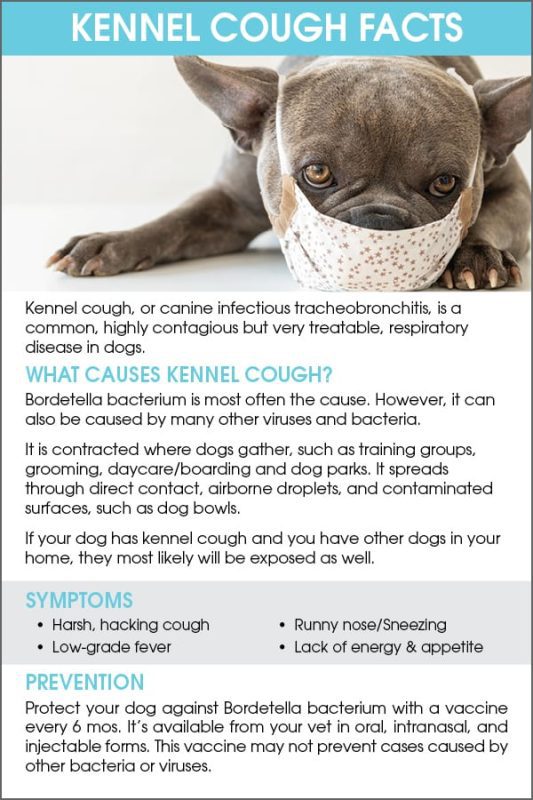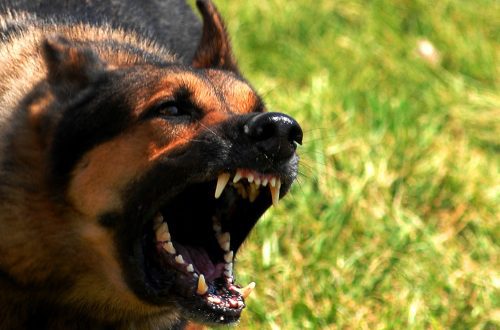
Hunden begynte å hoste: 6 mulige årsaker
If the dog began to cough, you need to understand the reasons. They can be both mild conditions and life-threatening. Six common diseases that cause coughing in dogs are:
Innhold
1. Hjertesykdom
One of the most common causes of coughing in dogs is a disease of the heart valves, or heart muscle, which prevents the dog’s heart from pumping blood efficiently. Cough occurs as a result of an increase in the size of the heart sections with clamping of the main airways in the lungs or as a result of the “return” of fluid into the lungs.
Cough due to heart disease is mild and prolonged. If a pet dog is coughing due to heart disease, the cough is likely to get worse at night or when the pet is lying on its side. It may be accompanied by a decrease in activity and endurance.
If the veterinarian determines that the dog is constantly coughing due to heart disease, he will prescribe appropriate medications.
2. Lungebetennelse
Pneumonia is a common disease that owners often think about when they worry about why their dog is coughing. Pneumonia, or pneumonia, can be caused by bacteria. It is also provoked by viral infections, such as canine flu or distemper, difficulty swallowing, regurgitation, or certain metabolic disorders.
With inflammation of the lungs, the cough in dogs sounds wet and soft. Pneumonia is usually accompanied by high fever, poor appetite, and lethargy. To recover, the pet will need the help of a veterinarian, plenty of fluids, rest, and possibly even hospitalization.

3. Kennel cough
Another common reason for a dog to cough frequently is kennel cough. This is the common name for tracheobronchitis, an infectious inflammation of the trachea (windpipe) and the main lower respiratory tract. Although kennel cough is more common in young dogs, dogs of any age can be affected. Pets that are often in close proximity to each other—during training, at a dog house, or in a kennel—are at a higher risk of contracting an infection. If a dog starts coughing after being in a crowded area, it could be kennel cough.
This is a sharp, dry and raspy cough that is aggravated if the dog pulls on the leash for a walk. Kennel cough can even cause spitting up and vomiting.
Kennel cough clears up on its own, but antibiotics and cough medicines are often given to relieve symptoms and reduce the chance of complications, such as pneumonia. Dogs with kennel cough are highly contagious. Kennel cough is caused by a form of the bacterium Bordetella bronchiseptica. There is a vaccine against it that will protect the pet from infection in the future. It is worth discussing vaccinations with a veterinarian to reduce the chance of infection.
4. Trakeal kollaps
Tracheal collapse is a condition in which the trachea, or windpipe, becomes soft and flexible. It most commonly affects small and miniature breeds, including Spitz, Chihuahua, Pug, and Shih Tzu. The scientific name for this condition is chondromalacia tracheae.
Dogs with tracheal collapse have a dry, hacking, and spasmodic cough. The pet coughs in attacks, after which it takes a long time to leave. At the same time, the cough intensifies if the dog pulls the leash during a walk.
If a dog has a collapsed trachea with complete occlusion of the lumen, it will cough like an asthmatic cough. It is exacerbated in overweight or obese dogs, in animals that are hot, agitated, and in dogs with allergies or atopy. Four-legged friends with a collapsed trachea often have bronchitis and/or heart disease, so they may have several different types of coughs.
Treatment for a collapsed trachea includes weight loss measures, medications such as cough suppressants, bronchodilators, steroids, and antibiotics. In severe cases, a veterinarian may recommend surgery.
5. Dirofilariasis of the heart
The likelihood that a dog’s cough is caused by heartworms may be higher or lower depending on where you live. Although heartworms are more common in warm regions, the risk of contracting this parasite exists wherever the mosquitoes that carry it are found.
Dogs infected with heartworms may cough or show no signs of illness at all, depending on the size of the dog, the amount of parasites and the general health of the animal. Symptoms of the disease, if present, include a persistent mild cough, lethargy, weight loss, and decreased appetite. Severe forms of heartworm infection can lead to signs of heart failure, including bloating due to fluid buildup.
6. Canine Flu
Animals, like people, are susceptible to infection with the flu, which is called canine flu. Cough results from a respiratory infection that can last ten to thirty days.
Most likely, as part of the treatment, the dog will be prescribed a course of medications. If there are other animals in the house, it is best to quarantine the sick pet in a separate room, as canine flu is contagious to animals. Fortunately, it is not transmitted to humans.
Hva skal jeg gjøre hvis hunden hoster?
If your dog starts coughing, take it to the veterinarian. Many causes of cough in dogs are completely curable, but proper diagnosis is essential for successful treatment.
At the veterinarian’s appointment, describe the dog’s cough in detail and report any other symptoms, such as coughing up blood, mucus, white foam, etc. After proper treatment, the dog will soon be able to bark loudly again.





